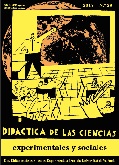Evaluation of the effect of guided inquiry on scientific competence in secondary school students
DOI:
https://doi.org/10.7203/dces.43.22909Keywords:
scientific competence, evaluation, guided inquiry, quasi-experimental design, test Abstract
Abstract
This research has two objectives: to provide evidence about the efficacy of the Inquiry Based Science Education (IBSE) methodology to develop the scientific competence of 12-13-year-old students and to establish a reliable way to evaluate that learning process through an ad-hoc designed test. A quasi-experimental design was used, with three groups performing a test with pre- and post- treatment measures. This test obtained a reliability statistic value of 0.75 in Cronbach's alpha. The analysis of variance showed that the group that received the treatment significantly improved its performance in scientific competence with respect to the groups that followed an expository teaching treatment. Likewise, it was observed that the effect size was very high (d = 1.2). The test has proven to be a useful tool in the quantitative assessment of scientific skills in first-year ESO students.
 Downloads
Downloads
Downloads
Additional Files
Published
How to Cite
-
Abstract793
-
PDF (Español)814
-
Artículo completo (Español)17
Issue
Section
License
![]()
The articles published at Didáctica de las Ciencias Experimentales y Sociales will have a Creative Common Licence Creative Commons Attribution-Noncommercial-No Derivative Works 3.0 Unported



